Dubai is a city known for its luxury shopping experiences, but for those seeking an authentic Middle Eastern marketplace, look no further than the souks of Dubai. These bustling markets offer a vibrant blend of sights, sounds, and scents, selling everything from intricate textiles to glittering gold jewellery. Among the most famous of these markets are the Gold Souk Dubai and the Dubai Spice Souk, but there are many others to discover as well. In this comprehensive guide, we will take you on a journey through the winding alleys of the souks of Dubai, exploring their unique character and offering tips on how to make the most of your shopping experience. Whether you’re a seasoned traveller or a first-time visitor to Dubai, this guide is a must-read for anyone interested in exploring the city’s rich cultural heritage.
Table of Contents
Travel tips for Dubai
- If you are still looking for a hotel, have a look at the Rove Downtown. I recommend it to everyone! If you want something more spectacular, check out my article on the hotels with the most amazing pools or the best beach hotels in Dubai.
- I cannot stress how important it is to book your tickets for the Burj Khalifa beforehand. Tickets on the day are often more expensive or sold out. Get yours here!
- Book a desert safari. It might be a bit corny, but it is quite a fun experience! You can find the best ones here.
- If you want to life the high life, why not book a luxury yacht tour of Dubai Marina or the Palm? My husband and I have taken quite a few and they are always a great day out! Check the best ones out here.
- Before heading to Dubai you might want to learn more about the dress code and what to pack. I have written an article about this here.
Best souk tours to book
- Dubai: Old Town, Creek, Museums, Souks & Street Food Tour
- Dubai: Creek, Souks, Blue Mosque & Inside Burj Al Arab Tour
- Dubai: Frame Tickets, Creek, Souks & Blue Mosque Guided Tour
- Dubai: Guided Walking Tour with Creek, Souks, & Street Food
- Dubai: Walking Tour, Creek, Abra Taxi, Souks, & Emirati Meal
Gold Souk
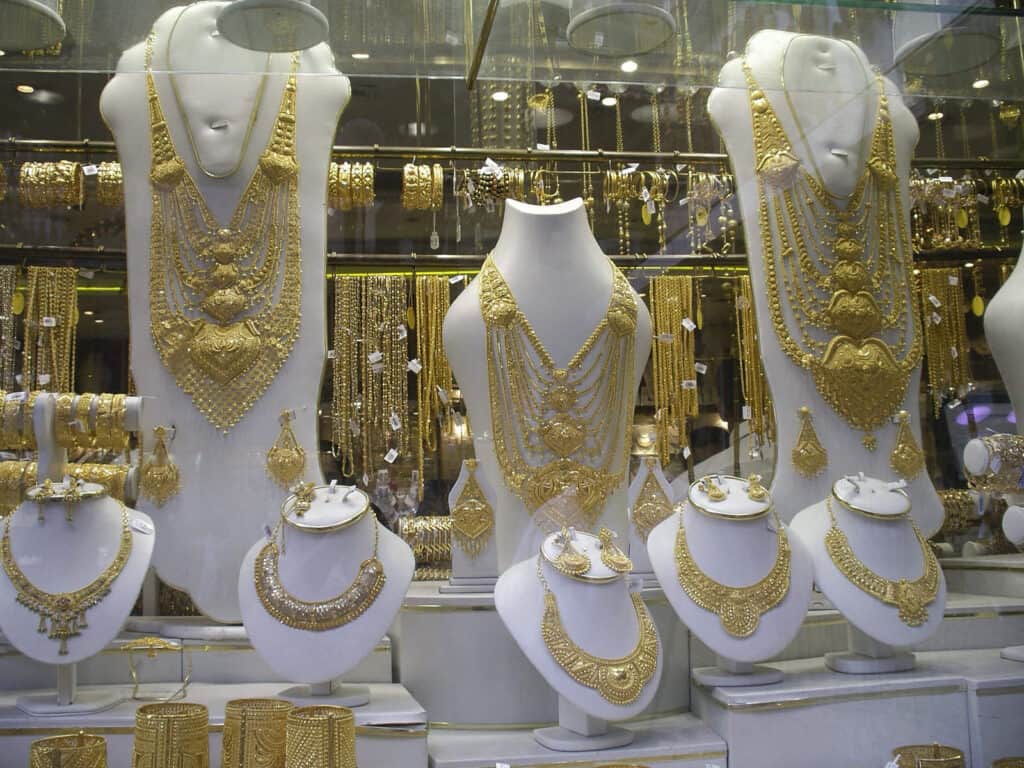
Dubai’s Gold Souk is a famous market in the heart of Deira, Dubai, where visitors can buy gold, platinum, and diamonds. The history of the souk dates back to the early 1900s when traders from India and Iran began to establish gold trading businesses in Dubai. However, the souk really flourished after the discovery of oil in the 1960s, as the influx of wealth brought more customers to the market.
The Gold Souk has over 300 shops, each one glittering with jewellery crafted in 18, 21, 22, and 24-carat gold. Visitors can browse through a range of designs from traditional to modern and can also find stunning Arabic designs. Apart from gold, the souk also has a vast collection of diamonds, pearls, and other precious gemstones.
One of the things to look out for in the Gold Souk is the bargaining process. Haggling is a cultural tradition here, and visitors are expected to negotiate the price with the seller. While the process can be daunting for some, it can be an exciting and memorable experience for others.
Another factor that draws visitors to the Gold Souk is the fluctuating gold prices. As a hub for gold trading, Dubai’s Gold Souk is heavily influenced by global gold prices. Visitors can expect to find lower gold prices compared to other parts of the world, and the market remains a popular destination for gold investment.
5 tips for visiting the Gold Souk in Dubai
- Brush up on your bargaining skills: Bargaining is an essential part of the shopping experience at the Gold Souk. Before you visit, brush up on your bargaining skills and be prepared to negotiate the price with the seller.
- Keep an eye on your belongings: The Gold Souk can be a crowded place, so it’s important to keep an eye on your belongings at all times. Carry your bags close to you, and avoid wearing too much jewellery, as this can make you a target for pickpockets.
- Research gold prices beforehand: Do some research on gold prices before visiting the Gold Souk, so you have an idea of what you should be paying for the items you’re interested in. This can help you negotiate a fair price with the seller.
- Take your time and shop around: With over 300 shops in the Gold Souk, it can be overwhelming to know where to start. Take your time and shop around, comparing prices and designs before making a purchase.
- Visit in the morning or evening: The Gold Souk can get crowded during the day, especially on weekends. To avoid the crowds, visit in the morning or evening when the market is less busy, and you’ll have more time and space to browse.
How to get to the Gold Souk by public transport?
The Gold Souk is located in the Deira area of Dubai and is easily accessible by public transport. Here are a few options:
- Metro: Take the Dubai Metro and get off at Al Ras station on the Green Line. From there, it’s a 10-15 minute walk to the Gold Souk.
- Bus: You can take Bus 27, 31, or 53 from the Ghubaiba Bus Station and get off at the Al Ras Metro Bus Stop. From there, it’s a short walk to the Gold Souk.
- Water Taxi: You can take a water taxi from the Dubai Creek and disembark at the Dubai Old Souk station. The Gold Souk is just a few minutes’ walk away from there.
- Taxi: Taxis are readily available in Dubai and can take you directly to the Gold Souk.
What are the open hours of the Gold Souk?
The Gold Souk in Dubai is usually open from Saturday to Thursday from 10:00 AM to 10:00 PM. On Fridays, the market opens at 4:00 PM and stays open until 10:00 PM. However, it’s always a good idea to check the opening hours beforehand as they may vary during Ramadan or on public holidays. Some shops may also have different opening and closing times, so it’s best to confirm the timings with the individual stores if you have specific ones in mind.
Dubai souk: Spice Souk in Dubai
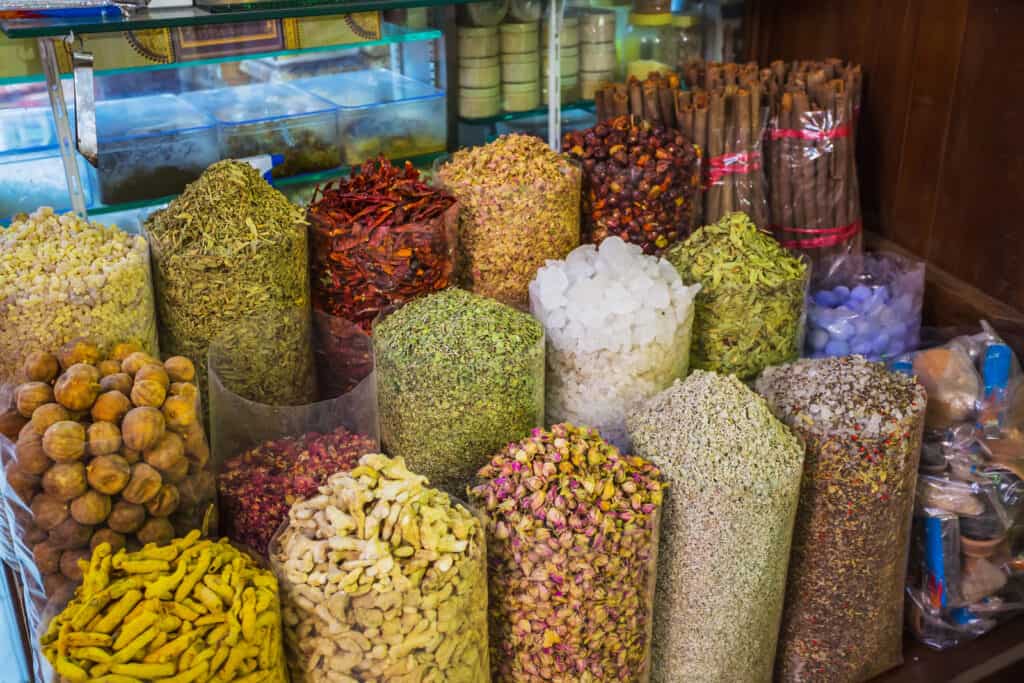
The Spice Souk in Dubai is a vibrant and colourful market located in the historic Deira district of the city. The souk is a bustling hub of trade and commerce, offering an array of spices, herbs, and traditional remedies. Here is everything you need to know about visiting the Spice Souk in Dubai:
The Spice Souk has a long and rich history dating back to the early 19th century when traders from India and Iran began to establish their businesses in Dubai. The souk became an important trading centre for spices and other commodities, and its reputation grew over the years. Today, the souk remains an essential part of Dubai’s cultural heritage and is a popular tourist destination.
When visiting the Spice Souk, look out for the vibrant colours and aromas that fill the air. The souk is a sensory delight, with its traditional Arabian architecture, narrow alleys, and colourful storefronts. Visitors should be prepared for the hustle and bustle of the market, with vendors vying for their attention.
The Spice Souk is home to a vast array of spices and herbs, including cardamom, saffron, turmeric, cumin, cloves, and cinnamon. You can also find traditional Arabian spices such as baharat, a blend of spices used in Middle Eastern cuisine, and za’atar, a herb mixture often used in dips and spreads. Visitors can also buy traditional medicinal remedies such as rosewater, henna, and natural oils.
The Spice Souk is a must-visit destination in Dubai for foodies and those interested in Arabian culture. The market offers a unique shopping experience and is a great place to pick up authentic souvenirs. With its rich history and vibrant atmosphere, the Spice Souk is an excellent way to experience Dubai’s traditional culture and get a taste of the local cuisine.
5 tips for visiting the spice souk in Dubai
- Wear comfortable shoes: The Spice Souk is a bustling market with narrow alleys and uneven surfaces. Wear comfortable shoes to navigate the market and avoid any discomfort or injury.
- Bargain: Bargaining is a common practice in the Spice Souk, and vendors expect it. Don’t be afraid to haggle for a better price, but remember to be respectful and fair.
- Watch for fake spices: Some vendors may sell fake spices, so it’s essential to be cautious. Look for high-quality products and make sure to smell the spices before purchasing them.
- Visit in the morning: The Spice Souk can get crowded and overwhelming, especially in the afternoons and evenings. Plan to visit in the morning when it’s quieter, and you’ll have more space to navigate and explore.
- Try the local food: The Spice Souk is not only a market for spices but also a place to sample traditional Arabian cuisine. Be sure to try some local food like shawarma or falafel from the many street vendors in and around the souk.
How to get to the spice souk in Dubai by public transport
Getting to the Spice Souk in Dubai by public transport is easy and convenient. Here are some options to consider:
- Dubai Metro: Take the Dubai Metro to Al Ras Metro Station on the Green Line. From there, it’s just a short walk to the Spice Souk.
- Bus: Take bus number C7 to the Al Ras Bus Station, which is just a few minutes’ walk from the Spice Souk.
- Abras: Take an abra (water taxi) across Dubai Creek to the Spice Souk. Abras depart from various stations on both sides of the creek and are an affordable and scenic way to travel.
- Taxi: Taxis are readily available throughout Dubai and can take you directly to the Spice Souk.
What are the open hours of the spice souk in Dubai
The Spice Souk in Dubai is typically open seven days a week, with the following hours:
Saturday to Thursday: 10:00 AM to 10:00 PM
Friday: 4:00 PM to 10:00 PM
However, these hours can vary during Ramadan, Eid holidays, and other special occasions. It’s always a good idea to check the hours before visiting to ensure that the souk will be open. Additionally, some vendors may open earlier or later than the official hours, so if you’re looking for a specific shop, it’s best to contact them directly or check their website.
Dubai souk: Dubai Perfume Souk
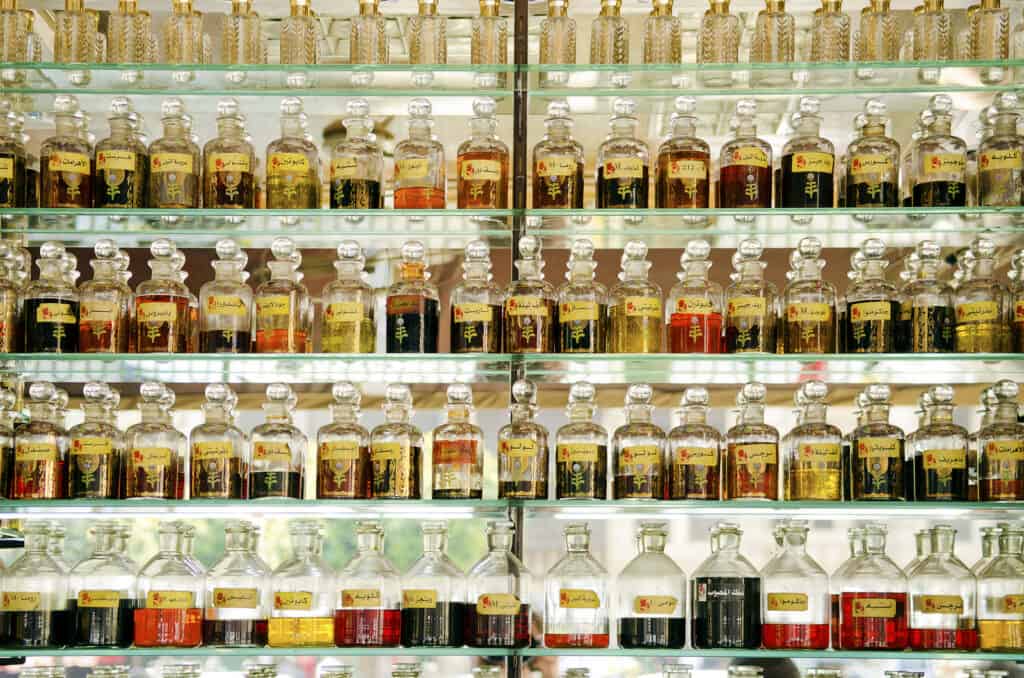
Perfumes have been a significant part of Arabian culture for centuries, and the Dubai Perfume Souk is a reflection of this tradition. The market dates back to the early 20th century when it was established to cater to the demand for perfumes and incense.
The Perfume Souk offers a wide variety of fragrances, from traditional Arabian scents to modern designer perfumes. Visitors can find everything from classic oud-based fragrances to floral, fruity, and spicy scents. The souk is also known for its attars, which are concentrated perfume oils made from natural ingredients like flowers, herbs, and spices.
The Dubai Perfume Souk is a popular destination for locals and tourists alike. Visitors come here to experience the rich aromas and indulge in the Arabian culture of fragrance. The souk is also known for its excellent quality and reasonable prices, making it an affordable luxury for many.
While the Dubai Perfume Souk is a delightful shopping experience, visitors should be aware of some potential scams. Some vendors may offer fake fragrances or adulterated products at low prices. To avoid this, it’s best to buy from reputable vendors and always check the authenticity of the product before purchasing.
As an insider tip, it’s also worth noting that the souk can get crowded, especially during peak hours. To avoid the crowds and get personalized attention, try to visit during quieter times, like mid-morning or mid-afternoon. Additionally, many vendors are willing to offer samples, so don’t be afraid to ask to try a scent before purchasing.
5 tips for visiting the Dubai Perfume Souk
- Do your research: Before you go, research the types of fragrances you’re interested in and familiarize yourself with the different notes and ingredients. This will help you navigate the market and make informed decisions when purchasing.
- Compare prices: Perfume prices can vary greatly between vendors, so it’s a good idea to compare prices and quality before making a purchase. Don’t be afraid to bargain with the vendors, but always be respectful.
- Test before you buy: Many vendors offer testers or samples, so take advantage of this opportunity to try before you buy. This will help you get a better sense of the fragrance and ensure that it’s a good fit for you.
- Choose reputable vendors: To avoid scams or low-quality products, stick to reputable vendors with good reviews. You can also ask locals or hotel staff for recommendations.
- Visit during off-peak hours: The souk can get crowded, especially during peak hours, so try to visit during quieter times, like mid-morning or mid-afternoon. This will give you more space to browse and allow you to interact with vendors more easily.
How to get to the perfume souk by public transport
The Dubai Perfume Souk is located in the Deira district, near the Dubai Gold Souk and the Spice Souk. Here’s how to get there by public transport:
By Metro: Take the Green Line and get off at Al Ras Metro Station. From there, it’s a short walk to the Perfume Souk.
By Bus: The Deira Old Souk Bus Station is located near the souks, and many bus routes pass through this station. Check the RTA website or app for bus schedules and routes.
By Abra: For a more scenic route, take an abra (water taxi) across Dubai Creek from the Bur Dubai side to the Deira side. The abra ride is a short but enjoyable trip, and you’ll get a great view of the city skyline.
Once you arrive at the Deira district, the Perfume Souk is located near the Gold Souk and the Spice Souk, so it’s easy to navigate on foot. It’s also worth noting that taxis and ride-hailing services like Uber and Careem are widely available in Dubai and can be a convenient option for getting to the souks.
Open hours of the Dubai perfume Souk
The opening hours of the Dubai Perfume Souk may vary slightly depending on the vendor, but generally, it is open from 10:00 am to 10:00 pm daily. Some vendors may close during lunchtime, typically between 1:00 pm to 4:00 pm. It’s a good idea to check the opening hours of specific vendors or the souk as a whole before you visit to ensure you don’t miss out on anything. During Islamic holidays and festivals, the opening hours may be different, so it’s best to check with the souk management or vendors in advance.
Dubai textile souk

The Dubai Textile Souk is a vibrant market located in the historic Bur Dubai district, just across the Dubai Creek from the more famous Dubai Gold Souk and Spice Souk. Here’s what you need to know about this fascinating market:
The Textile Souk dates back to the early 20th century when traders from India, Iran, and other parts of the Middle East began to sell fabrics and textiles to the local population. Today, it is a hub for textiles, fabrics, and traditional garments from across the region.
The souk is a treasure trove of fabrics, with vendors selling everything from silk and cotton to linen, wool, and more. You’ll also find traditional garments like the abaya and kandora, as well as colourful scarves, shawls, and embroidered textiles. Many vendors also sell tailor-made garments and offer customization services.
As with most markets in Dubai, haggling is expected in the Textile Souk. It’s best to start by asking for a lower price than what is initially quoted and negotiate from there. Remember to be polite but firm, and don’t be afraid to walk away if you’re not happy with the price.
If you’re looking for a specific fabric or textile, it’s a good idea to do some research before you visit the souk. Some vendors specialize in certain types of fabrics or designs, so you’ll have a better chance of finding what you’re looking for if you know where to look. You can also ask locals or hotel staff for recommendations.
5 tips for visiting the Dubai textile souk
- Wear comfortable shoes: The souk is a maze of narrow alleyways and walkways, so wear comfortable shoes that you can walk in for an extended period.
- Bring cash: While some vendors may accept credit cards, it’s always best to bring cash to the souk, as haggling is the norm here and cash gives you more negotiating power.
- Start early: The souk can get crowded and hot during the day, so it’s best to visit in the morning when it’s cooler and less busy.
- Compare prices: Take the time to shop around and compare prices from different vendors before making a purchase. You may find the same item at a lower price at another vendor.
- Respect local customs: The souk is located in a conservative area of Dubai, so dress modestly and avoid wearing revealing clothing. Also, ask for permission before taking photos of people or products, as some vendors may prefer not to be photographed.
How to get to the Dubai textile souk by public transport
The Dubai Textile Souk is located in the Bur Dubai area of Dubai, on the opposite side of the Dubai Creek from the Deira area. Here are some ways to get to the souk by public transport:
- Dubai Metro: Take the Dubai Metro’s Green Line and get off at the Al Fahidi Station. From there, it’s a short walk to the souk.
- Bus: Take a local bus to the Al Fahidi bus stop, which is located next to the souk.
- Abra: Take an abra (traditional wooden boat) across the Dubai Creek from the Deira area to the Bur Dubai area. The abra station on the Bur Dubai side is located near the souk.
- Taxi: Taxis are readily available throughout Dubai, and most drivers will know how to get to the Textile Souk.
What are the open hours of the Dubai textile Souk
The Dubai Textile Souk is typically open from 9:00 am to 10:00 pm, seven days a week. However, it’s worth noting that some vendors may have different opening and closing times, and the souk may close earlier during certain holidays or special occasions.
Dubai souk: Souk Madinat

Souk Madinat is a modern interpretation of a traditional Arabian souk located in the heart of Dubai. Built in 2004, it features over 75 shops, restaurants, and cafes, and is a popular destination for both tourists and locals.
Unlike many of Dubai’s other souks, Souk Madinat is a relatively new addition to the city’s shopping scene. However, it has quickly become one of the most popular destinations for visitors looking for a unique shopping and dining experience.
One of the main draws of Souk Madinat is its wide variety of shops selling traditional and modern souvenirs, such as handmade jewellery, clothing, textiles, ceramics, and other handicrafts. Visitors can find everything from locally-made perfumes and spices to luxury fashion brands and high-end home décor.
Another major attraction of Souk Madinat is its extensive selection of upscale restaurants and bars. With over 20 dining options to choose from, visitors can enjoy everything from traditional Arabian cuisine to international dishes, along with stunning views of the waterways and nearby Burj Al Arab.
Tourists like Souk Madinat for its mix of traditional and modern elements, making it a unique and exciting destination to explore. The souk’s architecture and design are modelled after a traditional Arabian village, with narrow walkways and winding canals, while its modern amenities provide visitors with all the comforts of a modern shopping and dining experience.
5 tips for visiting Souk Madinat in Dubai
- Shop around for the best prices: Souk Madinat has a variety of shops and vendors, so take your time to explore and compare prices before making a purchase. Don’t be afraid to haggle, as it is a common practice in many of the souk’s shops.
- Visit during the evening: Souk Madinat has a lively and vibrant atmosphere during the evening hours when the shops are open later and the restaurants and bars come alive. It’s a great time to enjoy the ambiance and take in the views.
- Dress appropriately: As Souk Madinat is located in a more upscale area of Dubai, it’s recommended to dress modestly and conservatively. This means covering your shoulders and knees, and avoiding revealing or tight-fitting clothing.
- Bring cash: Many of the shops and vendors in Souk Madinat may not accept credit cards, so it’s a good idea to bring cash with you. ATMs are available nearby if needed.
- Take a water taxi: To fully experience the atmosphere of Souk Madinat, consider taking a water taxi through the canals that wind through the souk. It’s a fun and unique way to get around and see the sights.
How to get to Souk Madinat by public transport
Souk Madinat is not easily accessible by public transport. I would recommend taking a taxi.
The nearest metro station is the Mall of the Emirates station on the Red Line. From there, you can take a taxi or a local bus to Souk Madinat, which is about a 10-15 minute drive away.
Alternatively, you can also take a water taxi or abra from the nearby Dubai Marina, which is a popular and scenic way to reach the souk. The Dubai Tram also stops nearby at the Jumeirah Beach Residence 2 station, which is within walking distance of Souk Madina in winter.
Open hours of Souk Madinat in Dubai
Souk Madinat is open daily from 10:00 AM to 12:00 AM (midnight). However, the exact opening and closing times of individual shops and restaurants within the souk may vary.
The Souk in Dubai Mall
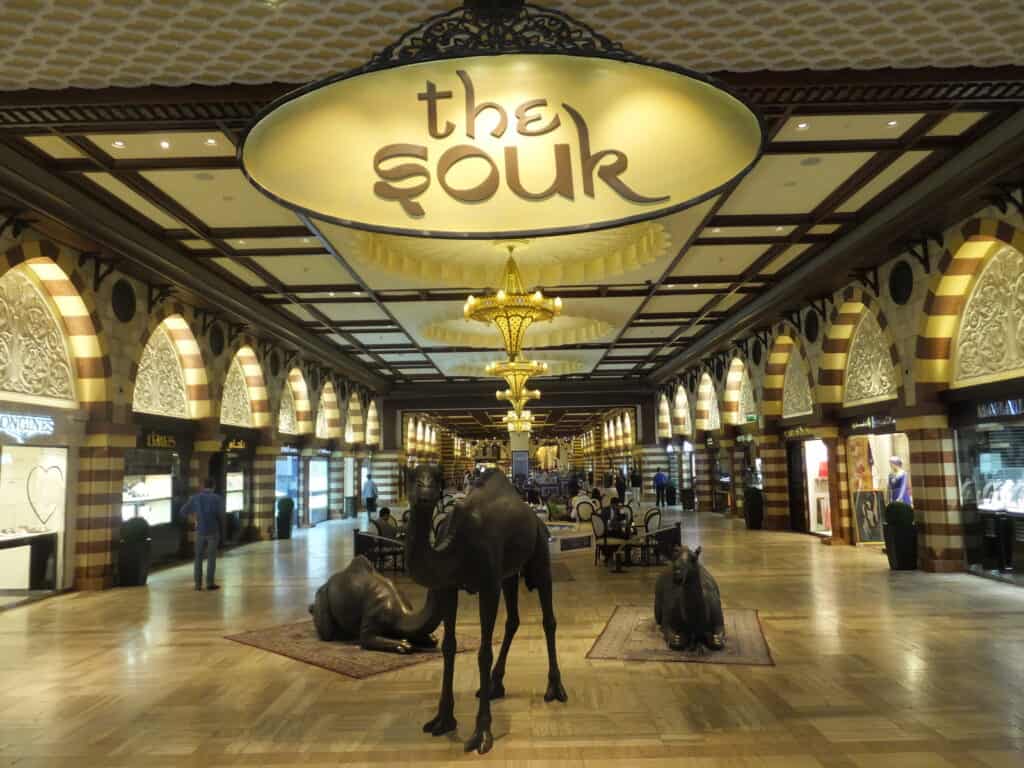
The Souk in Dubai Mall is a shopper’s paradise for those looking for jewellery, both traditional and modern. The souk is situated in one of the world’s largest shopping malls and is known for its stunning architecture, high-end stores, and luxurious ambiance.
The souk’s traditional Arabian-style architecture and decor create an immersive shopping experience that transports visitors to a different time and place. The shops and stalls in the souk offer a wide range of jewellery options, including local and international brands, designer pieces, and traditional Arabian jewellery.
What makes The Souk in Dubai Mall so popular is the variety of choices it offers for jewellery shoppers. Visitors can find anything from high-end luxury pieces to affordable fashion jewellery, ensuring that there’s something for everyone. The souk’s expert jewellers can also create custom pieces based on individual preferences, making it a popular destination for those seeking bespoke jewellery.
How to get to Dubai Mall by public transport
Dubai Mall is easily accessible by public transport. Here are some of the ways to get there:
- Metro: The Dubai Mall has its own dedicated metro station, called the Burj Khalifa/Dubai Mall Station, on the Red Line. Visitors can take the metro and get off at this station and follow the signs to reach the mall.
- Bus: There are several buses that stop near the Dubai Mall, including the F13, F19, F29, F42, and X22. Visitors can check the RTA website or ask for information at a nearby bus stop to find out the best bus route.
- Taxi: Taxis are readily available throughout Dubai, and visitors can easily hail a taxi to get to the Dubai Mall.
Souk Al Bahar
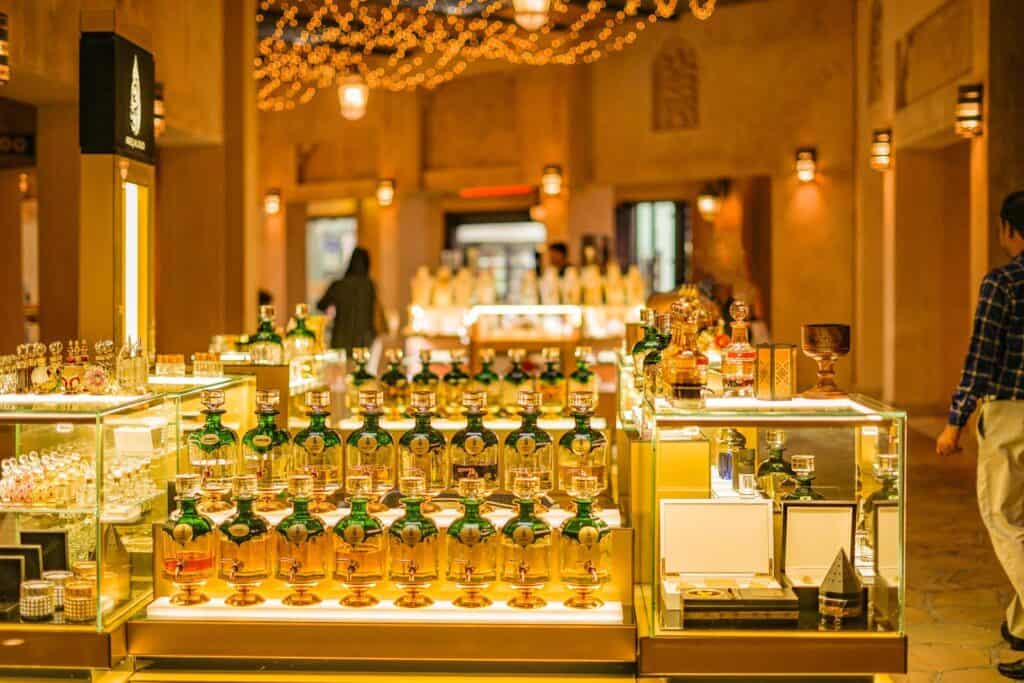
Souk Al Bahar is a popular shopping and dining destination located in Downtown Dubai, directly opposite the Dubai Mall and next to the Dubai Fountain. This souk offers visitors a unique shopping experience with its traditional Arabic architecture, souvenirs shops, and a variety of restaurants and cafes.
One of the main draws of Souk Al Bahar is its stunning views of the iconic Burj Khalifa, which can be seen from the many outdoor terraces and balconies located throughout the souk. This makes it a popular spot for tourists to take photos and soak up the atmosphere of downtown Dubai.
In terms of shopping, Souk Al Bahar offers a range of unique items, including traditional Arab clothing, accessories, souvenirs, and handicrafts. Visitors can browse through shops selling everything from perfumes and spices to jewellery and textiles, making it a great place to find gifts and souvenirs.
Dubai souk: Souk Al Marfa
Souk Al Marfa is a recently opened wholesale souk located in Dubai’s Deira Islands. The souk is a bustling market where vendors sell a wide range of products, including clothing, accessories, electronics, and household goods, at wholesale prices. Visitors to the souk can find a variety of products at discounted rates, making it a great place for bargain hunting.
One of the key features of Souk Al Marfa is its modern facilities, which provide a comfortable and convenient shopping experience for visitors. The souk features air-conditioned warehouses, loading docks, and parking facilities, making it easy for shoppers to access the market.
Visitors can also take advantage of the souk’s professional services, including logistics support, customs clearance, and shipping services, which are available on-site. This makes it a popular destination for businesses looking to source products at wholesale prices.
While the souk primarily caters to wholesale customers, individuals are also welcome to shop at Souk Al Marfa. Visitors can browse through the various stalls and negotiate prices with vendors to get the best deals on products. Haggling is a common practice in the souk, so shoppers should be prepared to bargain to get the best prices.
Best tours to visit the Dubai Souks
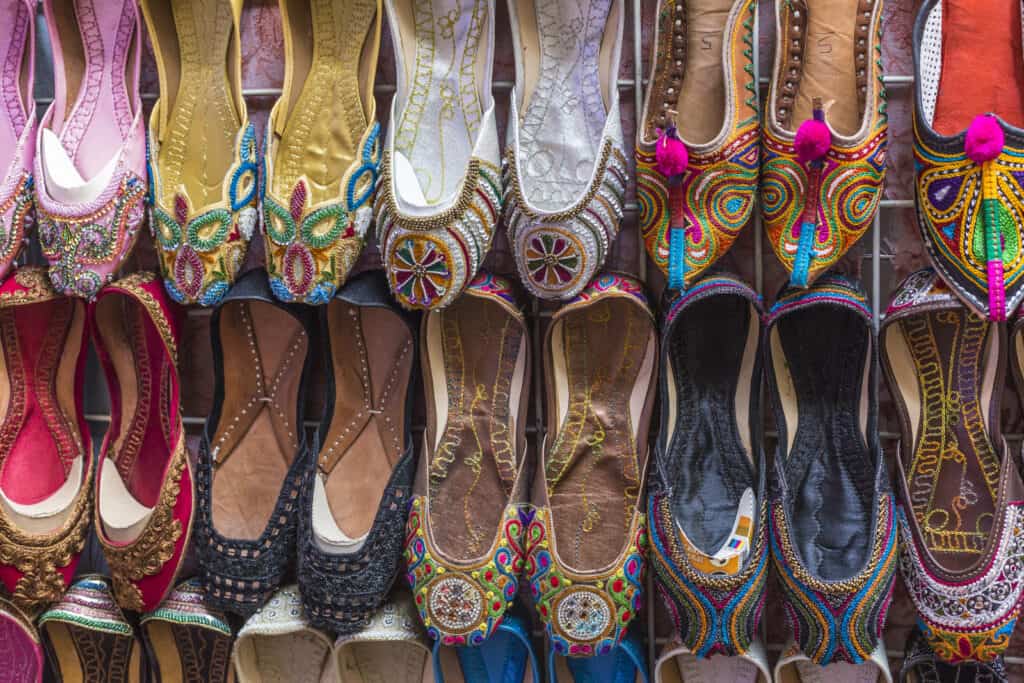
Dubai is known for its vibrant souks, where visitors can immerse themselves in a traditional shopping experience. From gold and spices to textiles and perfumes, there are many souks to explore in the city. Taking a guided tour can be a great way to navigate the bustling markets and learn about their history and cultural significance. Here are the best tours to take through the Dubai Souks.
Dubai: Old Town, Creek, Museums, Souks & Street Food Tour
The Dubai: Old Town, Creek, Museums, Souks & Street Food Tour is a perfect way to explore the cultural and historical side of Dubai. The tour takes you on a guided walking tour through the streets of Old Dubai, with stops at various museums and local markets. You can choose between a shared or private tour, with the option to try delicious local food and drinks, and cruise along Dubai Creek on a traditional boat. The tour also includes visits to the Spice Souk and Gold Souk, where you can shop for souvenirs and admire intricate metalwork, and try the famous camel milk chocolate.
Get price and availability for the Dubai: Old Town, Creek, Museums, Souks and Street food tour
Dubai: Creek, Souks, Blue Mosque & Inside Burj Al Arab Tour
The Dubai: Creek, Souks, Blue Mosque & Inside Burj Al Arab Tour takes you on an unforgettable journey through some of the most iconic landmarks in Dubai. The tour starts with a visit to the world’s largest man-made island, Palm Jumeirah, followed by a trip to the legendary Burj Al Arab, a seven-star luxury hotel. You will be escorted to the 180-meter-tall hotel atrium, which is considered the world’s tallest, and see the Royal Suite, experience suite, and the marvellous architectural backgrounds. Afterward, you will visit the serene Blue Mosque, which was inspired by the Blue Mosque of Istanbul. Finally, you’ll take a classic Abra taxi across Dubai Creek to the bustling Gold and Spice Souks where you can shop and eat.
Check price and availability for the Dubai: Creek, Souks, Blue Mosque And Inside Burj Al Arab Tour
Dubai: Frame Tickets, Creek, Souks & Blue Mosque Guided Tour
The Dubai: Frame Tickets, Creek, Souks & Blue Mosque Guided Tour is a great way to explore the city’s highlights with a licensed guide. After admiring the grandeur of the Dubai Frame, head to the historic Dubai Creek, where you can enjoy an Abra Ride and stroll through the vibrant Gold and Spice Souks. The souks are lined with shops and stalls selling exquisite gold and spice items, and your guide can provide tips on bargaining for the best prices. Don’t miss the chance to experience Emirati hospitality and learn about the old Emirati lifestyle at Al Khayma Heritage House before concluding the tour.
Check price and availability for the Dubai: Frame Tickets, Creek, Souks & Blue Mosque Guided Tour
Dubai: Guided Walking Tour with Creek, Souks, & Street Food
The Dubai Guided Walking Tour with Creek, Souks, & Street Food is a great way to experience the traditional side of Dubai. The tour starts with a visit to Al Khayma Heritage House where guests can enjoy Arabic coffee and dates. They can also explore the Al Fahidi Historical District, walk through its narrow alleyways and witness the beauty of the old buildings. Visitors can also sample some Emirati street food such as the Emirati bread Ragag, and sweets from Al Fahidi.
The tour includes a visit to the coffee museum where guests can learn about the history and culture of coffee in the UAE. The traditional Abra water taxi ride around Dubai creek offers stunning views of the city’s trading ships and buildings. The spice souk and gold souk are also worth a visit, where visitors can learn about various spices and try their bargaining skills for deals at the local shops. This tour is perfect for those who want to experience Dubai’s local culture and traditions while enjoying some delicious street food.
Check prices and availability for the Dubai: Guided Walking Tour with Creek, Souks, & Street Food
Dubai: Walking Tour, Creek, Abra Taxi, Souks, & Emirati Meal
On the Dubai Walking Tour, Creek, Abra Taxi, Souks, & Emirati Meal tour, you’ll experience the best of the city’s attractions, including the Al Fahidi Historical District, Al Seef Street, and the famous Gold Souk. Start with a welcome Arabic tea at Al Khayma Heritage Restaurant, where you will also try traditional Emirati dishes like luqaimat, Ragag, and camel milk ice cream. Admire the architecture and traditional interiors while learning about Emirati culture and lifestyle.
Visit the Al Fahidi Historical District, strolling along the peaceful Al Seef Street with its local stores. Stop by the Coffee Museum and nearby mosque to admire the architectural style. Take an Abra water taxi ride down Dubai Creek, watching the city skyline pass by. End the tour by exploring the Gold Souk’s collections of gold jewellery, admiring the craftsmanship and trying to barter for deals at the local shops.
Check prices and availability for Dubai: Walking Tour, Creek, Abra Taxi, Souks, & Emirati Meal
What are the Different Types of Souks in Dubai?
Dubai is home to a multitude of souks, each with its own unique selling points. From traditional markets to handicraft souks, there’s something for everyone in Dubai. Here are the different types of souks you can find in Dubai:
- Traditional Markets: These are the souks you’re probably most familiar with. They’re the souks you find in traditional Arab towns and cities, and they’re full of traditional Arab goods.
- Handicraft Souks: These are souks that focus on selling handmade products from local artists. They’re a great place to buy souvenirs and handmade items.
- Souks with a Mixed Heritage: Some souks in Dubai have a mixed heritage. This means they have both traditional and modern elements. This makes them a great place to buy both traditional and modern items.
- Souks with a Contemporary Element: There are a few souks in Dubai that have a contemporary element. This means they sell products that are popular right now. This can include clothes, accessories, and home items.
What Souks are the Best for Local Souvenirs?
Dubai has a range of souks where visitors can find unique and authentic local souvenirs to take back home. Here are some of the best souks in Dubai for local souvenirs:
- The Gold Souk: While the name suggests that this souk is primarily for gold shopping, visitors can also find traditional Arabic handicrafts, such as handwoven carpets, ceramic pottery, and traditional Arabic perfumes.
- The Spice Souk: In addition to spices, the Spice Souk is also a great place to buy traditional Arabic textiles, such as scarves and shawls, as well as Arabic sweets and dates.
- The Textile Souk: This souk is a great place to find traditional Arabic textiles, including embroidered fabrics, silk, and cotton. Visitors can also find traditional Arabic clothing, such as kaftans and abayas, and Arabic jewellery.
- Souk Madinat: This souk offers a range of souvenirs, including traditional Arabic handicrafts, such as pottery and jewellery, as well as luxury items like designer clothing and accessories.
- Souk Al Bahar: This souk offers a range of souvenirs, including traditional Arabic handicrafts, such as rugs and textiles, as well as luxury items like designer clothing and accessories.
Lieze Neven is a globetrotting travel writer and expat currently based in Nepal. With a passion for exploration, she has lived in Dubai, the UK, and Belgium, alongside her international teacher husband. Her parents live in France and she tries to visit Paris at least once a year. Together, they travel the world looking for the best hotels, experiences and food locations have to offer!

Do they speak good English?
Hi Mina!
The English spoken at the souks is overall quite good. Most salesmen are Pakistani while some are Egyptian or even Jordanian. They understand that most of their customers will not be able to speak Arabic.
Would you say gold in gold souk is cheap, or is it best to just go to a jeweller?
Hi Conal
It depends how well you can barter.
Have a look at the daily gold rate.
If you want to be safe and sure it might be best to go to a jeweller.
This was actually very helpful. Thanks!